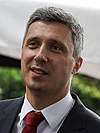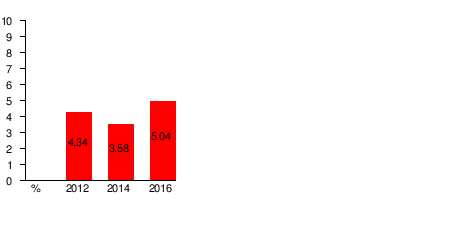Dveri
The Serbian Movement Dveri (Serbian: Српски покрет Двери / Srpski pokret Dveri, meaning 'doors') is a right-wing[16] to far-right[17][18] nationalist political movement in Serbia. The leader and founder of the movement is Boško Obradović.
Serbian Movement Dveri Српски покрет Двери Srpski pokret Dveri | |
|---|---|
 | |
| President | Boško Obradović |
| Founded | 27 January 1999 (political organization) 28 June 2015 (party) |
| Headquarters | Đorđa Jovanovića 11, Belgrade |
| Newspaper | Двери српске / Dveri srpske (Serbian Dveri) |
| Ideology | Familialism[1][2] Right-wing populism[3][4][5] Serbian nationalism[6][7][1][8][9] Christian right[8][9] Euroscepticism[9][10][11][12][13] Anti-immigration[14][15] Natalism[9] Anti-globalism[1][9] Conservatism[1] Russophilia[1] |
| Political position | Right-wing[16] to far-right[17][18] |
| Religion | Serbian Orthodox Church |
| National affiliation | Alliance for Serbia |
| Colours | Red, Blue and White (Serbian national colors) |
| Slogan | For the life of Serbia |
| Anthem | Himna za život Srbije "An anthem for the life of Serbia" |
| National Assembly | 0 / 250 |
| Assembly of Vojvodina | 0 / 120 |
| City Assembly of Belgrade | 0 / 110 |
| Party flag | |
 | |
| Website | |
| dveri.rs | |
Dveri were formed in 1999 as a Christian right-wing youth organisation gathered around the eponymous student magazine. Throughout the 2000s they operated as an NGO, promoting values of Serbian nationalism, Orthodox Christianity and family. In the 2010s they became a full-scale political party, participating in the 2012 general elections onwards. For the 2016 elections they formed a coalition with the conservative Democratic Party of Serbia, which entered the National Assembly with 5.02% of the popular vote and earning 13 seats, 7 of which belong to Dveri.
History
Organisation (1999–2011)
Dveri were founded by Branimir Nešić in 1999 as a Christian right-wing youth organisation consisting mainly of students from the University of Belgrade which regularly arranged public debates devoted to the popularisation of clerical-nationalist philosophy of Nikolaj Velimirović,[19] a bishop of the Serbian Orthodox Church who was canonized in 2003 and is considered a major anti-Western thinker.[20]
The organisation promotes a pronounced Serbian nationalist ideology. Based on the assessment of partiality and lack of condemnation of crimes by another ethnicity,[21] Dveri opposed a resolution passed by the Serbian parliament in March 2010 which condemned the Srebrenica massacre committed by the Bosnian Serb Army in eastern Bosnia in 1995,.[18] Dveri also fiercely oppose unilateral proclamation of independence of Kosovo and Metohija.[17] It is also well known for its opposition to gay rights.[17]
In October 2010 the very first Gay Pride parade was held in Belgrade, in which thousands of anti-gay protesters clashed violently with police units securing the parade participants. One of the far-right groups which organised the anti-gay protest were Dveri, and a member of the organisation was quoted by The Economist as saying that the protest was a form of "defence of the family and the future of the Serbian people".[2]
In August 2011, in the run up to the 2011 Pride Parade in Belgrade, the organisation warned that organising such an event could feed social unrest and provoke riots, and added that if the government allowed the march to go forward that "Belgrade will burn like London burned recently".[22] In fear of more violent clashes, the authorities eventually decided to cancel the event, a decision which was criticised by human rights groups such as Amnesty International, which specifically singled out Dveri and Obraz as the main right-wing nationalist groups responsible for "orchestrating opposition to the Pride".[23]
Citizen's group (2011–2015)

In March 2012 the movement collected 14,507 signatures to register as an electoral list for the May 2012 Serbian parliamentary election.[24] The Dveri Movement received 4.35% of the popular vote, failing to pass the 5% minimum threshold to enter parliament.
In September 2012 Dveri leader Vladan Glišić called for a "100-year ban" on pride parades in Belgrade, describing such an event as "promotion of a totalitarian and destructive ideology" and accused the ruling Socialist Party of Serbia of being influenced by a "gay lobby".[25]
In September 2013, in the run-up to another attempted gay pride march in Belgrade, Boško Obradović said that the event amounted to "the imposition of foreign and unsuitable values, laid out before minors - the most vulnerable section of society".[26]
In 2014, the eurosceptic Democratic Party of Serbia of ex-Prime Minister Vojislav Koštunica was considering options about the formation of a "Patriotic Bloc" which would stand up to the political elite's dominating pro-EU stance, the coalition being called forth by the Dveri (with the Serbian Radical Party mentioned as a potential third coalition partner) movement. However, DSS initially rejected the proposal, stating that the proposed parties did not fully embrace DSS positions and that they merely want to join to enter the parliament.[27] Dveri again ran alone in the March 2014 Serbian parliamentary election, winning 3.58% of the vote, failing again to pass the 5% minimum threshold to enter parliament.
In November 2014 Dveri and the Democratic Party of Serbia declared that they would contest the next elections as the "Patriotic Bloc" alliance.[28] In January 2015 PULS and the SLS also joined the bloc.[29]
Presidents of Dveri Movement (2015–Present)
| # | President | Born–Died | Term start | Term end | |
|---|---|---|---|---|---|
| 1 | Boško Obradović |  | 1976– | 28 June 2015 | Incumbent |
Electoral results
Parliamentary elections
| Year | Leader | Popular vote | % of popular vote | # of seats | Seat change | Coalitions | Government |
|---|---|---|---|---|---|---|---|
| 2012 | Vladan Glišić | 169,590 | 4.34% | 0 / 250 |
non-parliamentary | ||
| 2014 | Boško Obradović | 128,458 | 3.58% | 0 / 250 |
non-parliamentary | ||
| 2016 | 190,530 | 5.04% | 7 / 250 |
With DSS | opposition | ||
| 2020 | Election boycott | 0 / 250 |
SzS | non-parliamentary | |||

Presidential elections
| Election year | # | Candidate | 1st round votes | % | 2nd round votes | % | Notes |
|---|---|---|---|---|---|---|---|
| 2012 | 8th | Vladan Glišić | 108,303 | 2.77 | — | — | |
| 2017 | Boško Obradović | 83,523 | 2.28 | — | — |
See also
- Serbian nationalism
- Far right in Serbia
References
- Jovo Bakic (February 2013), Right-Wing Extremism in Serbia (PDF), Friedrich Ebert Stiftung, retrieved 18 March 2019,
It is reasonable to assume that the Serbian Radical Party lost some of its votes to Dveri, a highly conservative but not, or at least not yet, a far-right ideological and political movement, instead espousing a turn-of-the-twen- tieth-century conservatism much like Joseph de Maistre’s. This movement evidently enjoys the support of the more conservative parts of the Serbian Orthodox Church (SPC) and expressly rejects the fascist tradition, anti-Semitism and the use of violence to achieve ideological aims. It does, however, foster extreme conservatism, promoting the family as the most important social institution and advocating a religious-moralistic outlook. As one might expect, this movement fosters an explicitly homophobic position, evident in its organisation of Family Walks on the day before the Pride Parade; but it does not incite its supporters to physically assault the LGBT population. Following the Russian model, in 2012 it called on the government to ban the Parade for the next 100 years. Serbian nationalism and anti-globalisation (expressed in an anti-American orientation and a reserved attitude to the EU) are clearly important components of Dveri ideology so that one can say that it exhibits certain symptoms of the far right but these are not sufficient to classify the movement as such.
- "Hate in Belgrade". The Economist. 10 October 2010. Retrieved 7 February 2014.
- "The Dveri Movement Through a Discursive Lens: Serbia's Contemporary Right-Wing Nationalism". Retrieved 13 December 2018.
- Passarelli, Gianluca (2018). The Presidentialisation of Political Parties in the Western Balkans. Springer. p. 60.
- "Desni populisti i ekstremisti u Europi". Retrieved 13 December 2018.
- Srbi - svi i svuda
- "Serbia". Boško Obradović mandataru: Sve radite po starom, Dveri će glasati protiv izbora Vlade. Retrieved 10 August 2016.
- Nordsieck, Wolfram (2016). "Serbia". Parties and Elections in Europe. Retrieved 28 August 2018.
- Ljubomir Delevic (6 November 2013). "Introduction to nationalism in Serbia". your-art.sk. Retrieved 18 March 2019.
- Dveri Odgovaraju: Какав је ваш став према Космету и Европској Унији? (Translation:Dveri Answers: What is your stance towards Kosmet and the European Union?) Retrieved 24 February 2012.
- "Anti-EU nationalist parties gain foothold in new Serbian parliament after election recount". Retrieved 6 May 2016.
- "Pro-EU ruling party wins in Serbia". Archived from the original on 2 February 2017. Retrieved 29 April 2016.
- "Serbia's Eurosceptic Coalition Entering Parliament Confirmed". Retrieved 5 May 2016.
- Günay, Cengiz (February 2016). "Understanding Transit Asylum Migration: Evidence from Serbia". International Migration. 54 (4). doi:10.1111/imig.12237.
- Goll, Sebastian; Mlinarić, Martin; Gold, Johannes (2016). Minorities under Attack, Othering and Right-Wing Extremism in Southeast European Societies. Harrassowitz Verlag.
- "Vukadinović: DSS, Dveri i SRS nisu ekstremna desnica". Blic.
- Barlovac, Bojana (26 August 2011). "Serb Far-Right Group Prepares Poll Debut". Balkan Insight. Retrieved 6 February 2014.
- "Right wing movement to take part in elections". B92. 23 August 2011. Retrieved 7 February 2014.
- Byford, Jovan (2008). Denial and Repression of Antisemitism. Budapest, Hungary: Central European University Press. p. 17. ISBN 9789639776159.
- Buchenau, Klaus (2005). "From Hot War to Cold Integration? Serbian Orthodox Voices on Globalization and the European Union". Eastern Orthodoxy in a Global Age. Walnut Creek, CA: AltaMira Press. p. 64. ISBN 9780759105362.
- https://www.blic.rs/vesti/politika/dveri-u-srebrenici-se-nije-desio-genocid/xn1jdbd
- "Belgrade gay pride parade planned for October 2". AFP. 26 August 2011. Retrieved 7 February 2014.
- "Banning of Belgrade Pride is a dark day for human rights in Serbia". Amnesty International. 30 September 2011. Retrieved 7 February 2014.
- "RIK proglasio izbornu listu Dveri" (in Serbian). B92. 28 March 2012. Retrieved 2 May 2012.
- "Socialists described as having "strong gay lobby"". B92. 27 September 2012. Retrieved 7 February 2014.
- Vasovic, Aleksandar (26 September 2013). "Serbian gay rights activists say to march despite threats". Reuters. Retrieved 28 September 2014.
- Radio Televizija Srbije (RTS): Коштуница: ДСС самостално на изборе (in Serbian Cyrillic). 2 February 2014.
- DSS i Dveri formirali patriotski blok RTS, 18 November 2014
- Uz DSS i Dveri sada i PULS i SLS Blic, 30 January 2015
External links
- Official website
